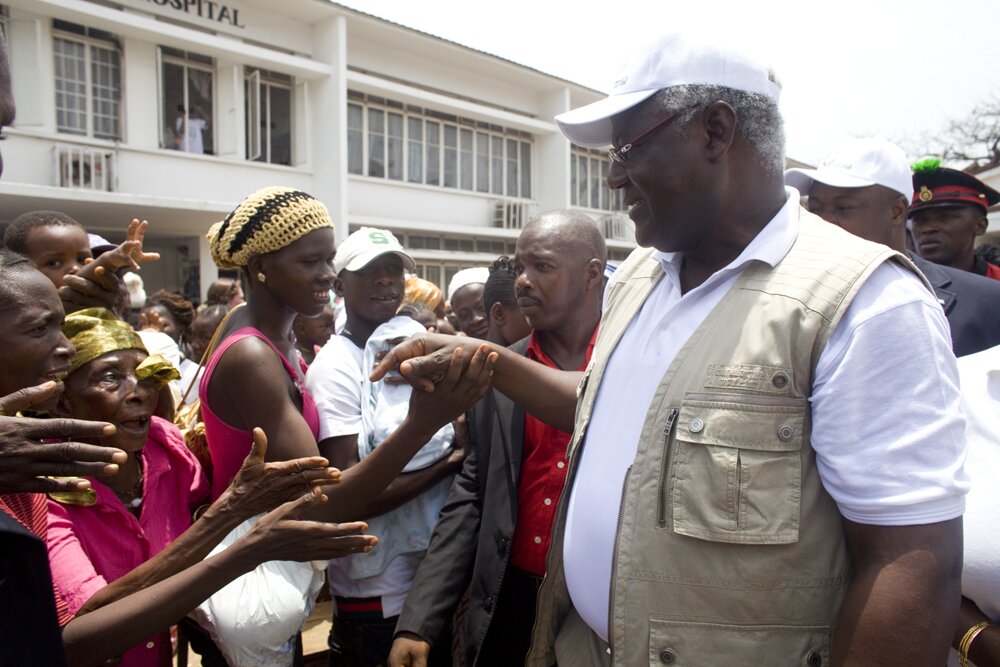What we're reading
 President Koroma Photo Credit Dominic Chavez |
Sierra Leone’s President speaks at Sierra Leone Conference on Development and Transformation
President Ernest Bai Koroma gave the keynote speech last week at the Sierra Leone Conference on Development and Transformation. In his speech, President Koroma spoke of plans to construct infrastructure, build a “healthcare system that is the envy of the world,” and eventually transform Sierra Leone from a recipient nation to a donor nation. President Koroma was not shy in stating that Sierra Leone is in charge of their own development: “It is within our rights to have this vision for Sierra Leone; it is within our rights to want to be in charge of our transformation, and it is within our rights to chart the way forward towards this great vision.”
Read a transcript of President Koroma’s entire speech here.
Eradication of polio in India attributed to country ownership
India recently shed its categorization as a polio-endemic country after completing a year free of polio cases. This is significant as in 1994 India experienced 4,791 cases a year and its neighboring counties, Pakistan and Afghanistan, are still labeled polio-endemic countries. The Indian Diplomat recently wrote that India’s success in beating polio is due to the government’s ownership of the solution. “India’s fight is also a model for how NGO’s and international donor support can be best utilized by developing nations. The key to India’s success in the fight was to take ownership of the problem and the solution, allowing for locals to learn from the expertise of the international community while not becoming dependent.”
The health benefits of the World Economic Forum
In a Huffington Post op-ed written by Dr. Sania Nishtar, lessons from the World Economic Forum (WEF) applicable to global health were highlighted. Bringing together the most innovative minds in both public and private sectors, the WEF can help facilitate public-private partnerships as countries strive for Universal Health Coverage. Nishtar writes: “The World Economic Forum's ability to bring together public and private actors creates a much needed space to explore the potential of engagement with the private sector to achieve Health for All.” With open conversation and cooperation, “Comparative advantages can be drawn upon and synergy exploited.” The WEF, Nishtar says, is helping to bridge the gap between private and public health entities.
Upcoming US elections' effect on women worldwide
In a recent Daily Beast article, the significance of the American election this November on women’s health in developing countries was highlighted. Threats by political candidates to cut out funding for reproductive health remains a fear in countries like Liberia where USAID is the largest provider of birth control. A Liberian midwife, Gertrude Gorma Cole, stressed that ending support for birth control will be detrimental to not only women, but to countries as a whole. “When you’re using family planning, you can help to prevent poverty,” she told the Daily Beast. “The mothers will have enough to feed their children.” Without that vital support, Cole said that “all the other aid that they give to Africa will not be useful.”
Keyword Search
MLI works with ministries of health to advance country ownership and leadership. This blog covers issues affecting the ministries and the people they serve.
Connect with Us
![]()
![]()
Categories
Blogs We Like
- Africa Can End Poverty
- Africa Governance Initiative
- Behind the Numbers
- CapacityPlus
- Center for Global Health R&D Policy Assessment
- Center for Global Development: Global Health Policy
- Center for Health Market Innovations
- Global Health
- Global Health Hub
- Global Health Impact
- The New Security Beat
- PAI Blog
- RH Reality Check
- Save the Children
- Transparency and Accountability Program
Contact Us
Please direct all inquiries to
